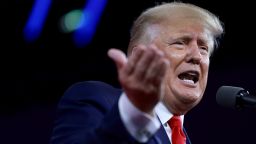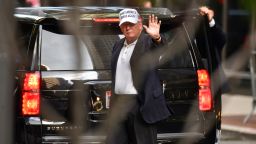The Manhattan district attorney said Thursday the criminal investigation into former President Donald Trump and his company is continuing with prosecutors reviewing new evidence, dismissing speculation that the case was closed following the high-profile departure of two senior prosecutors.
“We are every day following up on new evidence that we’ve secured,” Alvin Bragg Jr. told CNN in an interview. “Investigations are not linear so we are following the leads in front of us. That’s what we’re doing. … The investigation is very much ongoing.”
The comments from Bragg, a former federal prosecutor and assistant New York attorney general, are aimed at ending speculation that he has shut down the long-running investigation and comes six weeks after the prosecutors departed and Trump’s lawyers all but declared victory.
Bragg said he wanted the public to understand that he’s restrained from discussing “the meat” of the investigation but he said when it’s over he will inform the public about his conclusion – whether it’s an indictment or closing the case without charges.
Bragg wouldn’t place a timeline on the case saying investigations are not “linear.”
“When I was at the Attorney General’s office as chief deputy overseeing the entire office, I led the team that brought the successful litigation against the former president and the Trump Foundation. So I do what’s put before me. That’s what I’ve done as a career prosecutor, follow the facts and we’ll go where they take us and that’s what we’re doing each and every day in the office,” Bragg said.
He also said he would leave “no stone unturned” in the Trump investigation.
Bragg’s first three months in office have been clouded by a rise in crime in New York, a “Day One” memo that put him at odds with the New York Police Department, and the resignation of the veteran prosecutors leading the Trump investigation: Mark Pomerantz and Carey Dunne.
In late February, they resigned after Bragg said he would not authorize them to seek criminal charges from the special grand jury at that time, CNN reported.
In his resignation letter, which was reviewed by CNN, Pomerantz said he believed Trump was guilty of numerous felonies and Bragg’s decision to not move forward with an indictment at the time was “wrong” and a “grave failure of justice.”
“I believed that your decision not to prosecute Donald Trump now, and on the existing record, is misguided and completely contrary to the public interest,” Pomerantz added.
Pomerantz also said that the office had “evidence sufficient to establish Mr. Trump’s guilt beyond a reasonable doubt… I also do not believe that suspending the investigation pending future developments will lead to a stronger case or dispel your reluctance to bring charges.”
He also said: “I and others believe that your decision not to authorize prosecution now will doom any future prospects that Mr. Trump will be prosecuted for the criminal conduct we have been investigating.”
Bragg declined to elaborate on Pomerantz’s decision.
“I’m not going to presume to speak for anyone else,” Bragg said. “But for me I thought there were more avenues, more work to be done, more things that we could follow up on. That’s what our team that’s in place is doing each and every day.”
Separately on Thursday, New York Attorney General Letitia James asked a state court on Thursday to hold Trump in civil contempt for allegedly failing to comply with a court order that he turn over certain documents for her investigation.
Inherited investigation from previous DA
Pomerantz, who was semi-retired, was recruited by the previous district attorney, Cyrus Vance, for his expertise in complex financial investigations. Last summer Vance announced charges against the Trump Organization and its chief financial officer Allen Weisselberg, alleging they were engaged in a 15-year tax fraud scheme. The company and Weisselberg have pleaded not guilty.
Vance had authorized the attorneys on the team to present evidence to the grand jury late last year, but he did not seek an indictment. Those close to Vance say he wanted to leave the decision to Bragg. Others say the decision was an attempt to box Bragg into bringing the case early in his tenure. The special grand jury is set to expire in April, although it could be extended, or a new grand jury could be seated to hear evidence.
Bragg did not say if the lack of an internal cooperator is hindering the investigation.
“I’ve done cases with cooperators and cases without cooperators. Complex cases can unfold either way,” he said. “I look at investigations generally and the evidence at trial specifically as a totality. What we’re doing now is investigating to get that totality and then at that point we can make decisions.”
Since late last year, at least three career prosecutors asked to move off the investigation, which by the fall had narrowed its focus into the accuracy of the Trump Organization’s financial statements, which were provided to lenders, insurers and others. They were concerned that the investigation was moving too quickly, without clear evidence to support possible charges, people familiar with the investigation said.
Prosecutors encountered several hurdles to their investigation, mainly they did not have a cooperator, a key insider, who could testify that Trump knew the financial statements included false information. In addition to proving Trump had criminal intent, some of the prosecutors also believed there were issues with the financial statements themselves, which included caveats that they were not audited and did not necessarily follow US accounting rules.
In addition, none of the lenders lost money on the loans they extended to the Trump Organization, these people said. And many of them conducted their own review and risk assessment.
This story has been updated with additional comments from Bragg.


